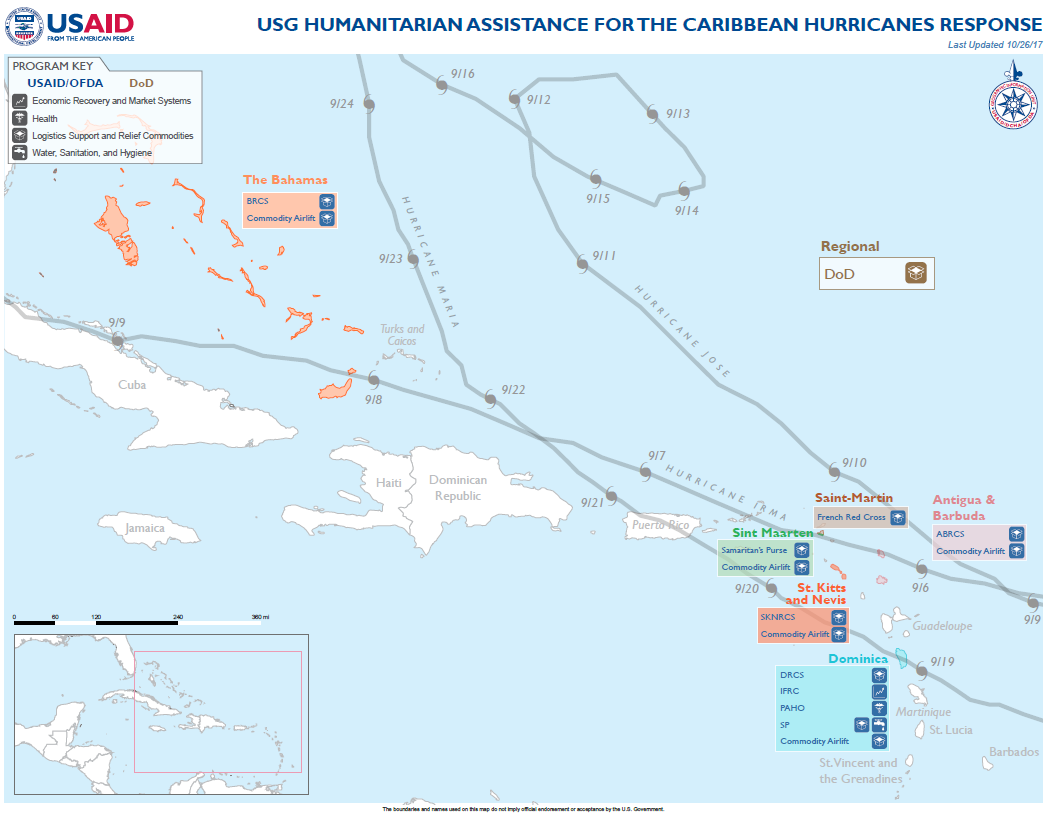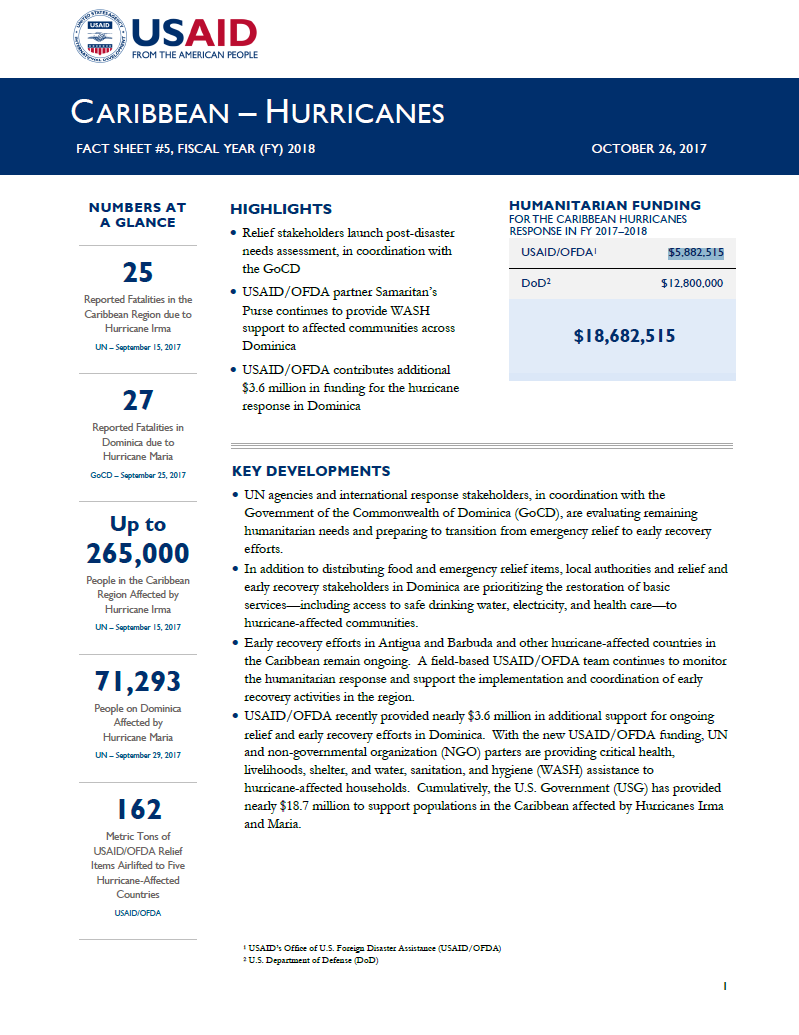Speeches Shim
October 26, 2017
Highlights
- Relief stakeholders launch post-disaster needs assessment, in coordination with the GoCD.
- USAID/OFDA partner Samaritan’s Purse continues to provide WASH support to affected communities across Dominica.
- USAID/OFDA contributes additional $3.6 million in funding for the hurricane response in Dominica.
Key Developments
Caribbean Hurricanes - Map #5 FY18 ![]() (pdf - 277k)
(pdf - 277k)
Numbers At A Glance
25
27
Up to 265,000
71,293
162
Humanitarian Funding
For the Caribbean Hurricanes Response in FY 2017
| USAID/OFDA | $5,882,515 |
| DoD | $12,800,000 |
| Total | $18,682,515 |
Caribbean Hurricanes - Fact Sheet #5 FY18 ![]() (pdf - 205k)
(pdf - 205k)
UN agencies and international response stakeholders, in coordination with the Government of the Commonwealth of Dominica (GoCD), are evaluating remaining humanitarian needs and preparing to transition from emergency relief to early recovery efforts.
In addition to distributing food and emergency relief items, local authorities and relief and early recovery stakeholders in Dominica are prioritizing the restoration of basic services—including access to safe drinking water, electricity, and health care—to hurricane-affected communities.
Early recovery efforts in Antigua and Barbuda and other hurricane-affected countries in the Caribbean remain ongoing. A field-based USAID/OFDA team continues to monitor the humanitarian response and support the implementation and coordination of early recovery activities in the region.
USAID/OFDA recently provided nearly $3.6 million in additional support for ongoing relief and early recovery efforts in Dominica. With the new USAID/OFDA funding, UN and non-governmental organization (NGO) parters are providing critical health, livelihoods, shelter, and water, sanitation, and hygiene (WASH) assistance to hurricane-affected households. Cumulatively, the U.S. Government (USG) has provided nearly $18.7 million to support populations in the Caribbean affected by Hurricanes Irma and Maria.
HUMANITARIAN COORDINATION AND LOGISTICS SUPPORT
As humanitarian response efforts in Dominica continue and the transition to early recovery begins, UN agencies and NGOs—including USAID/OFDA partners—are coordinating with the GoCD to meet priority humanitarian needs, including access to safe drinking water, emergency food assistance, and shelter support. A field-based USAID regional team, including three USAID/OFDA disaster risk management specialists supporting response coordination at Dominica’s Emergency Operations Center, continues to support relief and early recovery efforts in the region.
On October 18, representatives from the Caribbean Development Bank, Eastern Caribbean Central Bank, European Union, Organization of Eastern Caribbean States, UN agencies, and the World Bank launched a post-disaster needs assesment in Dominica. In coordination with the GoCD, the assessment aims to develop a comprehensive recovery strategy, including bolstering community and local government capacity for recovery and reconstruction.
USAID/OFDA partner the Dominica Red Cross Society (DRCS) had distributed emergency relief items—including blankets, food, hygiene kits, kitchen sets, plastic sheeting, and shelter kits—to approximately 2,000 hurricane-affected people as of October 17.
SHELTER AND SETTLEMENTS
Hurricane Maria damaged or destroyed more than 60 perecent of houses across Dominica, according to an initial aerial survey conducted by the Pacific Disaster Center. GoCD officials are conducting a countrywide damage and needs assessment to identify the most vulnerable communities and families requiring shelter assistance; preliminary estimates indicate that approximately 57,000 people are in need of shelter support, according to the UN.
Between October 11 and 15, the International Organization for Migration (IOM) surveyed more than 360 displaced households—comprising more than 1,860 people—at approximately 100 collective shelters across Dominica. Preliminary survey results emphasized the need for shelter assistance and home repair to support returns to places of origin, the UN reports.
USAID/OFDA partner DRCS aims to provide approximately 5,000 people with emergency shelter assistance, including plastic sheeting and tool kits. In addition, DRCS plans to equip an estimated 2,500 people with materials and training to construct durable roofs.
USAID/OFDA recently provided an additional $2.5 million to NGO partner Samaritan’s Purse to provide shelter and WASH assistance to hurricane-affected families in Dominica.
HEALTH AND WASH
The Dominica Water and Sewerage Company (DOWASCO) had repaired 14 of Dominica’s 44 water supply networks—serving approximately 39,000 people, or more than half the country’s population—as of October 14, the UN reports. DOWASCO continues to rehabilitate water supply networks; however, delivery of safe drinking water to communities, health care facilities, collective centers, and schools remains necessary until remaining water networks are repaired, according to the UN.
With USAID/OFDA support, Samaritan’s Purse has installed four mobile water treatment plants in Dominica, with the capacity to provide access to safe drinking water for an estimated 10,800 people per day. A total of 11 mobile water treatment plants were operational across Dominica as of October 14, according to the UN.
Nearly 40 of 49 health centers in Dominica were operational as of October 19, the UN reports. Functioning health centers continue to require water and fuel for generators, according to the UN. To support overburdened local health workers and facilities, six emergency medical teams managed by the Pan American Health Organization (PAHO), including a team deployed by Samaritan’s Purse, remain in Dominica to provide emergency care, as well as health assistance for people with chronic illnesses. USAID/OFDA recently contributed $250,000 to PAHO for emergency health assistance to hurricane-affected populations.
FOOD SECURITY AND LIVELIHOODS
Many food markets in Dominica, particularly in rural areas, remain closed due to a lack of available commodities. In response, humanitarian actors continue to provide emergency food assistance to vulnerable populations.
Significant constraints hinder the recovery of food production activities throughout Dominica, the UN reports. Clearing of secondary and tertiary roads to restore access to markets and farmland; provision of fishing boats, engines, and heavy farm equipment; and provision of fencing material and shelter for livestock are necessary to improve food security conditions in the country.
USAID/OFDA recently contributed $800,000—including $500,000 to the International Federation of Red Cross and Red Crescent Societies (IFRC) and $300,000 to the UN World Food Program (WFP)—for livelihoods assistance in Dominica. With USAID/OFDA support, IFRC will provide unconditional cash transfers to vulnerable families, enabling hurricane-affected households to purchase priority needs, while increasing communities’ purchasing power and boosting local economic recovery.
OTHER HUMANITARIAN ASSISTANCE
On October 19, a Royal Netherlands Navy ship transported nearly 380 MT of food commodities and 100 MT of relief items for WFP and IOM distribution to hurricane-affected households in Dominica.
The Dominica Flash Appeal, released by the UN and the GoCD on September 29, requests $31.1 million to support relief and early recovery activities through December 2017. International donors had provided $5.9 million—nearly 19 percent of the requested total—toward the appeal as of October 19. In addition, international donors have provided $4 million, or approximately 15 percent of the $27.1 million request, toward the Hurricane Irma Regional Response Plan for the Caribbean region.
CONTEXT
During successive weeks in September, hurricanes Irma, Jose, and Maria tracked through the Caribbean. The storms, particularly Irma and Maria, brought destructive winds, heavy rainfall, and dangerous storm surge to affected islands, leading to at least 52 fatalities and causing significant infrastructure damage across the region.
On September 6, U.S. Chargé d’Affaires, a.i., Lisa A. Johnson issued a disaster declaration in response to the anticipated effects of Hurricane Irma in The Bahamas, and on September 7, U.S. Ambassador to Barbados and the Eastern Caribbean Linda S. Taglialatela issued a disaster declaration in response to Hurricane Irma and the anticipated effects of Hurricane Jose in Antigua and Barbuda. In response, USAID/OFDA contributed an initial $100,000 each to the Bahamas Red Cross Society and the Antigua and Barbuda Red Cross Society.
On September 7, USAID activated a regional DART and stood up a Washington, D.C.-based Response Management Team to coordinate the USG’s humanitarian response to the hurricanes.
On September 9, U.S. Embassy in Paris Chargé d’Affaires D. Brent Hardt issued a disaster declaration for French Saint-Martin, and on September 10, U.S. Embassy in The Hague Chargé d’Affaires Shawn Crowley declared a disaster for Sint Maarten due to the effects of Hurricane Irma and anticipated effects of Hurricane Jose. In response, USAID/OFDA contributed an initial $100,000 each for activities in Saint-Martin and Sint Maarten.
Following the passage of Hurricane Maria, Ambassador Taglialatela issued disaster declarations for Dominica and Saint Kitts and Nevis on September 19 and 22, respectively. In response, USAID/OFDA provided an initial $100,000 to Dominica and $50,000 to Saint Kitts and Nevis for immediate humanitarian relief efforts.
On October 2, Ambassador Taglialatela renewed the disaster declarations in Antigua and Barbuda and Dominica for FY 2018 due to continued humanitarian needs caused by hurricanes Irma and Maria.
On October 9, the DART demobilized, initiating a shift to a field based USAID/OFDA regional team that will continue to monitor the humanitarian response and support the implementation and coordination of early recovery activities.
PUBLIC DONATION INFORMATION
The most effective way people can assist relief efforts is by making cash contributions to humanitarian organizations that are conducting relief operations. A list of humanitarian organizations that are accepting cash donations for disaster responses around the world can be found at www.interaction.org.
USAID encourages cash donations because they allow aid professionals to procure the exact items needed (often in the affected region); reduce the burden on scarce resources (such as transportation routes, staff time, and warehouse space); can be transferred very quickly and without transportation costs; support the economy of the disaster-stricken region; and ensure culturally, dietary, and environmentally appropriate assistance.
More information can be found at: USAID Center for International Disaster Information: www.cidi.org or +1.202.661.7710. Information on relief activities of the humanitarian community can be found at www.reliefweb.int.



Comment
Make a general inquiry or suggest an improvement.